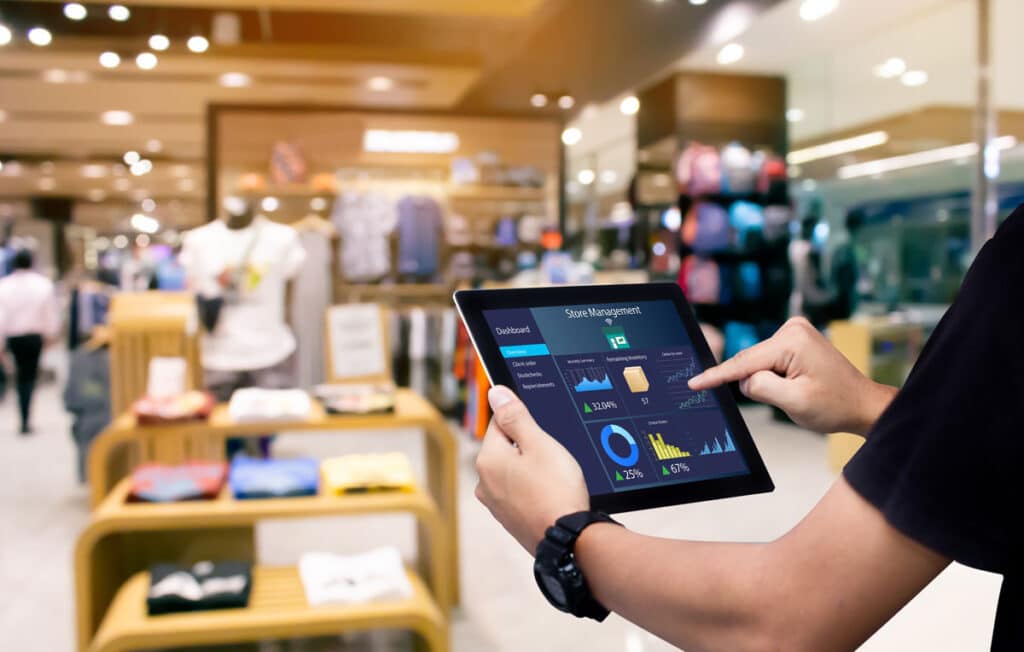Retail, Luxury Goods, and CPG

The retail, luxury goods, and CPG sector is changing in fascinating ways. Traditional models are being replaced by more fluid approaches, as repairability, subscriptions, and the circular economy redefine the concept of value. These days, products themselves are only part of the equation. Success also depends on a company’s ability to build rich, interactive ecosystems. Under this model, brands are becoming emotional and operational anchor points capable of both addressing and anticipating the needs of consumers who prize purpose and excellence.
That’s where we come in. We combine our expertise in digital transformation consulting, logistics software publishing, and Salesforce integration to meet your challenges. We don’t offer ready-made solutions. Instead, we listen attentively to your needs, build a deep understanding of your priorities, and seek to make a tangible impact. Every project is guided by a sense of pragmatism and your realities on the ground. And every solution is designed to be useful, sustainable, and tailored to your ambitions.
Striking a balance: Innovation, performance, and commitment
Rethinking business models to align values, flexibility, and profitability
The aims of the new business models emerging in the retail, luxury goods, and CPG sector are threefold: to win over value-conscious customers, to meet regulatory requirements, and to protect margins from the impact of rising costs. Consumers, especially younger age groups, prize access over ownership and are drawn to comprehensive, hassle-free solutions that combine products and services. In luxury goods and retail, repairability and recyclability are emerging as key differentiators, attracting the attention of sustainability-conscious audiences. Renting, sharing, and subscribing are becoming the norm, allowing companies to build a loyal customer base and diversify their revenue streams. Brands no longer just sell products. Rather, they foster long-term relationships by offering packaged solutions, such as unlimited access to selected products, customization options, and extended warranties. These game-changing developments demand the root-and-branch transformation of systems and processes.
Solutions include:
- Overhauling IT systems to support the management of subscriptions, rentals, and services.
- Orchestrating data by using a CRM system to anticipate needs and personalize the customer experience.
- Using advanced automation to simplify workflows associated with new business models.
- Pursuing an integrated sustainability strategy to ensure that every initiative is consistent from an environmental and legal standpoint.
Improving the customer experience through operational performance
Today, every interaction shapes a brand’s image and directly impacts its operational performance. The key to standing out lies in a brand’s ability to offer every customer a unique, memorable experience one that will keep them coming back and turn them into brand ambassadors. While optimizing internal processes remains crucial for protecting a company’s bottom line, tools such as journey automation systems prove that it’s possible to combine operational simplicity with an enhanced customer experience. It’s this ability to blend strong differentiation, sustainable credentials, and customer experience that draws customers in and keeps them loyal. Targeted, personalized products and services boost margins, while immersive experiences whether in-store or online appeal to today’s tech-savvy, social media-native customers. In fact, social media platforms are the real drivers of reputation, amplifying brands’ image and connecting them with their audiences. Rolling out a customer experience-centric strategy requires companies to rethink their products, services, and processes from logistics to marketing in a way that strikes a sustainable balance between operational excellence, differentiation, and profitability.
Brands can shape memorable experiences and achieve operational excellence by:
- Using CRM systems and omnichannel orchestration to manage customer data centrally, allowing for frictionless personalization and effective marketing campaign tracking.
- Leverage data usingAI for predictive analytics, anticipating trends and optimizing promotions.
- Rolling out immersive technologies (AR/VR) to enhance online and in-store interactions.
- Automating key processes such as omnichannel logistics (returns, orders, reservations) and marketing campaigns with artificial intelligence.
- Adopting an integrated design thinking approach when redesigning business models, making customer needs, innovation, and sustainability key strategic priorities.
Leveraging data
Data is central to brands’ strategies, serving as a cornerstone of long-term success. Data is much more than an intangible asset: it offers insights into consumer behavior, guides decision-making, and takes operational performance to new heights. In today’s fiercely competitive market, where every decision can make a difference, understanding this information is of paramount importance. Likewise, these insights need to be actioned whether it’s scheduling a promotional campaign at the right time, adjusting a product or service in line with the latest trends, or anticipating a demand peak to prevent stock shortages. When leveraged intelligently, data unleashes unprecedented business opportunities, such as adopting simple, useful new practices, or embracing a trend that makes a tangible difference to the customer experience. Now, more than ever, luxury goods and CPG brands need to be able to capture and leverage this intangible capital if they are to have any hope of success.
There are several ways for brands to harness the power of data:
- An advanced CRM system to pull customer data together in one place, giving a 360° view of behavior and trends and supporting personalized marketing campaigns.
- AI-enabled precision, leveraging predictive analytics to anticipate trends and adjust strategies.
- Automated personalization, using omnichannel tools to fine-tune recommendations, promotions, and customer journeys in real time.
- Optimized operations, leveraging operational insights to adjust logistics flows and prevent stock shortages.
- Intelligent data connection to cross-reference customer, product, and transaction information, and pinpoint new drivers of strategic and operational performance.
Protection as the cornerstone of trust
The volume of sensitive data gathered by brands in this sector is vast from payment information and customer preferences, to personal contact details, purchase histories, and more. Complying with regulations such as the GDPR and the AI Act is an essential first step toward ensuring that this data is collected and processed in line with the rules. But compliance alone isn’t enough, because companies also need to protect the data they hold against cyberattacks, which can seriously undermine the trust of an organization’s customers and partners as well as its reputation. A data leak can lead to financial penalties, customer churn, and a significant loss of market share. The risk of a breach is higher than ever in today’s omnichannel age, with its ever-growing number of touch points—e-commerce, mobile apps, connected stores, and more. As a result, companies not only have to strengthen their defenses but also build their operational resilience so they’re ready to react quickly if an incident occurs. Product authenticity is another driver of trust in the retail and luxury goods sectors. End-to-end traceability is therefore essential to prevent counterfeiting, keep consumers informed, and protect a brand’s credibility.
Brands can maintain customers’ trust by:
- Implementing advanced protection features such as encryption, intrusion detection systems, and multifactor authentication (MFA) protocols.
- Using blockchain technology to support product life cycle transparency and authenticity, especially for luxury and eco-responsible goods.
- Strengthening compliance, using dedicated tools to ensure adherence to regulations such as the GDPR and to streamline audits.
- Building operational resilience and incorporating cybersecurity into key business processes for effective crisis planning and management.
Combining expertise and vision:
Your priorities are our focus
What sets us apart? Our ability to leverage our triple expertise in digital transformation consulting, logistics software publishing, and Salesforce integration to devise targeted, impactful actions that address your priorities and the imperatives of your market.
Through Hardis Tech Services, we support you on your transformation journey by structuring your systems and aligning your practices with your ambitions. Through Hardis Supply Chain, we make your logistics operations more seamless and robust than ever before. And through Cloudity, we leverage tailor-made Salesforce applications to turn every customer interaction into an engagement opportunity.
Our strength also lies in our approach: we’re attentive to the realities of your business, working steadfastly and collaboratively with you to shape purposeful, sustainable projects. Because innovation alone isn’t enough. What counts is tailoring innovation to your unique qualities.
